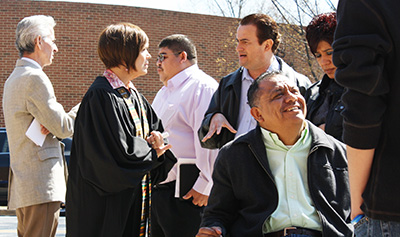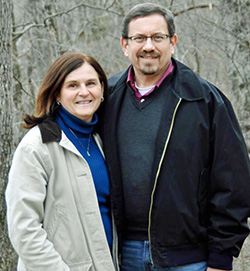By Greg Warner
No one objects when missions personnel feed the hungry or attend to the sick. But is advocacy on behalf of immigrants and refugees also part of the gospel?
For Cooperative Baptists who minister among Hispanic immigrants, the gospel means not only meeting human needs but making sure the government does its part, too.
“It’s justice,” said Linda Jones, missions coordinator for the Cooperative Baptist Fellowship of North Carolina, whose churches have been particularly proactive about reforming U.S. immigration policy. She said the mandate is biblical.
“All through Scripture, it tells us to welcome the ‘alien,’ the immigrant,” Jones said.
 “It’s easy to say ‘we stand up for justice and fairness,’ but it really comes down to action,” said Sue Smith, who with her husband, Greg, founded a nonprofit organization in Fredericksburg, Va., that helps new immigrants adjust to American culture and the U.S. legal system.
“It’s easy to say ‘we stand up for justice and fairness,’ but it really comes down to action,” said Sue Smith, who with her husband, Greg, founded a nonprofit organization in Fredericksburg, Va., that helps new immigrants adjust to American culture and the U.S. legal system.
The Smiths are CBF field personnel and also minister to Latinos on behalf of the Virginia Baptist Mission Board.
Immigration reform is the primary focus of the Smiths’ advocacy work. “It’s so big,” Greg said. “Who knows how much difference it can make?”
A broken system
CBF Executive Coordinator Suzii Paynter wants to see more Cooperative Baptists advocating for immigration reform and searching for solutions to the problems that many immigrants face.
“Our immigration system is broken,” said Paynter, whose pre-CBF career focused on immigration, predatory lending, anti-human trafficking, hunger and poverty. “We have laws that don’t work anymore.”
It is essential that Christians become visible advocates for immigrants and reform, Paynter said, if only because they have no vested interest.
“Most voices in the public square are speaking for selfish reasons,” Paynter said. “To have voices in the public square who are speaking for someone else is pretty rare.”
Looming on the horizon — and affecting immigration ministry on almost every level — is the possibility of immigration reform. The U.S. Senate has passed a bill that updates antiquated laws and improves the circumstances of the 12 million people in the United States without proper documentation. There is a push in the House of Representatives to take up the Senate bill or similar legislation.
The Senate bill allows for immigrants already here to apply for temporary worker status, reducing the fears of deportation; provides a “path to citizenship” that will take immigrants 10-plus years to complete; and protects the borders from illegal entry.
“You have to address the systemic issues or nothing is going to change,” Jones said of reform. “Is it not justice to give [undocumented immigrants] a path to citizenship? Not the ones who have just hopped over the fence, but the ones who have lived here a long time.”
Keeping families together
Advocates say the greatest benefit of reform is keeping families together. Immigrant families live in constant fear of deportation, which often splits up families, several field personnel said.
“That’s not justice and that’s not serving us well as a nation,” Jones said. “Not all immigrants will want to become citizens. They just don’t want to be thrown out of the country.”
“So many people don’t understand,” Greg Smith added, “the kind of worries and stresses that [undocumented immigrants] have each and every day — worries that documented residents and citizens do not routinely have. Worries of being detained and deported because of not having the right papers. Worries of not being paid for a job they do because of thinking — wrongfully so, but nevertheless widespread — that undocumented immigrants have no recourse when an employer simply refuses to pay you.”
 The Smiths’ organization, LUCHA Ministries, helps immigrants — legal residents and undocumented ones — adjust to the “struggle” (lucha in Spanish) of living in a new country. LUCHA represents “the presence of Christ” by providing Latinos with English classes, school tutoring and guidance through the American legal, educational and medical systems.
The Smiths’ organization, LUCHA Ministries, helps immigrants — legal residents and undocumented ones — adjust to the “struggle” (lucha in Spanish) of living in a new country. LUCHA represents “the presence of Christ” by providing Latinos with English classes, school tutoring and guidance through the American legal, educational and medical systems.
In recent years, the Smiths sponsored groups of teenagers from their program to attend Passport summer camps. Such an opportunity is rare for immigrant teens. But the prospect of sending their young people by themselves to a camp in Massachusetts was too scary for some undocumented parents, who feared a sudden encounter with law enforcement could leave them separated from their children.
“It took a whole lot of convincing on our part to get the parents to place their kids in our care for that week,” Greg recalled. “They had never allowed that to happen before.”
Trust, but …
Eventually the parents consented because they trusted the Smiths. “Without that trust having already been built, they would never have allowed us to take their kids so far away.” But in 2011, when LUCHA took youth to a camp in Georgia, some would not relent.
“The parents were doubly concerned because of the bad press that Georgia and other southern states had — rightfully — received for some of their draconian attitudes and laws toward immigrants,” Greg said, noting an alternate site was not available. “Parents, and frankly us too, to a large degree, were concerned about their kids going to a state that was widely seen as not friendly to immigrants.”
One family’s fear seemed especially justified, Sue Smith said, because the father had been deported two months earlier. He was able to return to his family only after paying a smuggler to get him in illegally. “But he lived in constant fear,” she said, “because if you get caught a second time the penalties are stiffer” — including jail time.
Sending their two teenage boys away to camp in Georgia “was just more than they could take,” Sue said. “It was very sad because the parents said, ‘We just can’t do that. That could be my kid getting deported.’”
“Immigration reform, at its root, is a moral issue and not simply a legal or economic issue,” Greg emphasized. The reason is because immigrants face widespread discrimination in America — “a society that happily tolerates one segment of the population living in the shadows as essentially second-class people,” he said.
Immigrants encounter discrimination and profiling based not only on skin color, Greg said, but also on “accent, appearance, the kind of car you drive, the decals on the car you drive, the way your home looks, the dirty shoes sitting outside your front door — which means you are a day laborer and ‘obviously’ undocumented.”
Contentious conversation
Greg understands not everyone is in favor of reform or advocacy at all. In fact, the whole topic of social justice stirs strong feelings.
“It’s a conversation we still need to have — what is the church’s role in immigration, deportation and national security?” he said.
“Not everyone wants to have that conversation,” Greg acknowledged. For many Baptists, the gospel is about salvation, and ministry should be evangelistic. “I’m not sure that’s as much theological as it is cultural,” he said.
“It’s much safer to deal on a spiritual level,” he said, because then “issues of social justice and poverty don’t come into the conversation.” As difficult as it is to accomplish politically, Greg predicted, immigration reform “will become law.”
Recently the Smiths and other field personnel who minister with Hispanics started collaborating more closely to step up CBF’s advocacy on behalf of various immigrant populations
“Though our ministries are very different,” Sue said, “immigration and immigration reform affect all of us. We can all learn from each other.”
